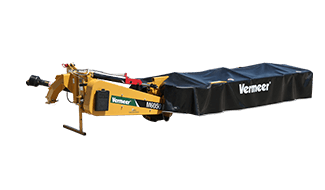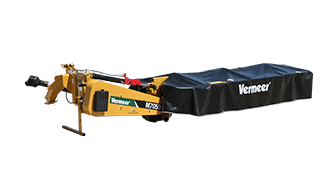Quick Hitch hookup, blade retention system create new efficiencies in 3-point disc mowers
For decades, hitch systems for implements like 3-point mowers have been a source of frustration for operators. Hooking up a 3-point system can be a tough job; so much so that it’s not uncommon for an implement to remain hooked up for the entire growing season. For some operators, it’s better to dedicate a tractor to a specific 3-point implement because of the time, effort and number of farm hands required to hook up and unhook traditional 3-point systems.
Hitch it up quickly
With the introduction of the new Vermeer M5050, M6050, M7050 and M8050 3-point disc mowers, the era of 3-point irritation is over. The new mowers feature a Quick Hitch hookup that minimizes the hassles associated with hooking up and unhooking the implements — plus, it’s now a one-person job, according to Vermeer Product Manager Josh Vrieze.
“The biggest pain point we’ve heard from customers in the past is that 3-point implements are a pain to hook up. With the new 50-series 3-point mowers, we’ve made that process so much more convenient,” Vrieze said, adding the new mowers were designed and are being manufactured at the company’s Pella, Iowa, global headquarters. “With the Quick Hitch hookup — it’s a one-person job with a few steps — then you’re ready to mow.”
Change blades in seconds
The new 50-series 3-point disc mowers also feature the Vermeer Quick Clip® blade retention system. Though available on previous mower models, the mechanism that enables the operator to change blades in mere seconds will add to the time savings of the 50-series 3-point disc mowers, Vrieze added.
“Systems like the Quick Clip system have been around a while, and they have caught on across the industry,” he said. “But, it’s an option on some competitors’ machines while it comes standard on the Vermeer 50-series 3-point disc mowers.”
Get your tractor back
The net effect of these features on the 50-series 3-point disc mowers is more efficient use of time behind the wheel when mowing hay. Beyond the improved convenience of the new mowers, they offer another major benefit for those accustomed to the previous drawbacks of 3-point systems. While some operators would previously dedicate specific tractors to their mowers, the ease of hooking up and unhooking Vermeer 50-series 3-point disc mowers can now free up those tractors for other tasks during the growing season, magnifying the efficiency gains of the new mowers.
“We’ve changed 3-point disc mowing. Now, you no longer need to hook up the mower and segregate that tractor all summer,” Vrieze said. “You can get that tractor back when you’re not mowing hay.
Contact your local dealer to learn more about the 50-series mowers by Vermeer.




